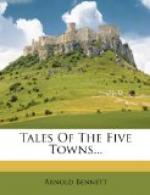Hanbridge, Knype, Longshaw, and Turnhill laughed heartily, and perhaps a little viciously, at this paragraph, but Bursley was annoyed by it. In print the affair did not look at all well. Bursley prided itself on possessing a unique dignity as the ‘Mother of the Five Towns,’ and to be presided over by a goosedriver, however humorous and hospitable he might be, did not consort with that dignity. A certain Mayor of Longshaw, years before, had driven a sow to market, and derived a tremendous advertisement therefrom, but Bursley had no wish to rival Longshaw in any particular. Bursley regarded Longshaw as the Inferno of the Five Towns. In Bursley you were bidden to go to Longshaw as you were bidden to go to ... Certain acute people in Hillport saw nothing but a paralyzing insult in the opinion of the Signal (first and foremost a Hanbridge organ), that Bursley could find no better civic head than Josiah Curtenty. At least three Aldermen and seven Councillors privately, and in the Tiger, disagreed with any such view of Bursley’s capacity to find heads.
And underneath all this brooding dissatisfaction lurked the thought, as the alligator lurks in a muddy river, that ’the Earl wouldn’t like it’—meaning the geese episode. It was generally felt that the Earl had been badly treated by Jos Curtenty. The town could not explain its sentiments—could not argue about them. They were not, in fact, capable of logical justification; but they were there, they violently existed. It would have been useless to point out that if the inimitable Jos had not been called to the mayoralty the episode of the geese would have passed as a gorgeous joke; that everyone had been vastly amused by it until that desolating issue of the Signal announced the Earl’s retirement; that Jos Curtenty could not possibly have foreseen what was about to happen; and that, anyhow, goosedriving was less a crime than a social solecism, and less a social solecism than a brilliant eccentricity. Bursley was hurt, and logic is no balm for wounds.
Some may ask: If Bursley was offended, why did it not mark its sense of Josiah’s failure to read the future by electing another Mayor? The answer is, that while all were agreed that his antic was inexcusable, all were equally agreed to pretend that it was a mere trifle of no importance; you cannot deprive a man of his prescriptive right for a mere trifle of no importance. Besides, nobody could be so foolish as to imagine that goosedriving, though reprehensible in a Mayor about to succeed an Earl, is an act of which official notice can be taken.
The most curious thing in the whole imbroglio is that Josiah Curtenty secretly agreed with his wife and the town. He was ashamed, overset. His procession of geese appeared to him in an entirely new light, and he had the strength of mind to admit to himself, ‘I’ve made a fool of myself.’
Harry went to London for a week, and Josiah, under plea of his son’s absence, spent eight hours a day at the works. The brougham remained in the coach-house.




